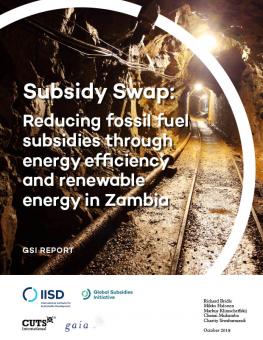
Subsidy Swap: Reducing fossil fuel subsidies through energy efficiency and renewable energy in Zambia
This report examines the potential of subsidy reform to improve cost recovery in the electricity sector and promote clean energy and energy efficiency in Zambia.
In Zambia’s electricity sector, demand has risen faster than supply.
In response to rising demand, several new power plants have been commissioned, including the 300 MW Maamba coal power plant and the 120 MW Itezhi Tezhi hydropower plant in 2016. Subsidies, particularly in the form of under-recovery of electricity sector revenues caused by below-cost pricing, have led to electricity sector deficits and threatened the financial sustainability of the sector.
Price increases in the electricity sector in 2017 of 75 per cent have reduced electricity sector subsidies, but costs remain higher than revenues. This report explores how subsidy reform could help to reduce the cost of subsidies and promote a transition to energy efficiency and clean energy. The report focuses on the mining sector, which is responsible for more than half of all electricity consumption, and the potential of solar PV.
Participating experts
You might also be interested in
Fossil Fuel Subsidy Reform in Aviation and Shipping
Countries can address fossil fuel subsidies in aviation and shipping by changing legislation to allow for reform and introducing emission levies.
Federal Legislative Authority in Relation to Oil and Gas Development in Canada
This report outlines federal legislative authority related to oil and gas development in Canada.
Five Key Priorities to End Fossil Fuel Subsidies in Canada
As the G7 president in 2025, Canada has a pivotal opportunity to lead by fully phasing out fossil fuel supports and investing in a cleaner, more equitable future. Here are five recommendations for effective subsidy reform.
The Cost of Fossil Fuel Reliance
Government support for fossil fuels reached at least USD 1.5 trillion in 2023, new data shows.